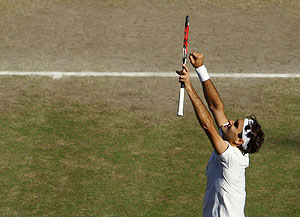Young excellence, promotion battles, and a happy farewell: The Australian team of the week from players around the globe
Even though St.Pauli ultimately lost a high-scoring affair, Jackson Irvine was a standout, as well as scoring a late goal.

Roger Federer of Switzerland acknowledges the crowd after defeating Andy Roddick of U.S. in the men's final match on the Centre Court at Wimbledon, Sunday, July 5, 2009. (AP Photo/Julian Finney, pool)
At midnight tonight the sporting decade comes to an end – a decade that witnessed a select group of great athletes rewriting the record books and dominating their sports, and a decade in which cheating took on new and ever more ingenious forms.
While doping remained at the forefront of cheating – see Marion Jones, Barry Bonds, Alex Rodriguez and countless cyclists – some sunk to new lows.
The Renault Formula 1 team hatched an ingenious scheme by asking Nelson Piquet Junior to crash intentionally at the 2008 Singapore Grand Prix to benefit teammate Fernando Alonso. Piquet duly planted his Renault into the wall, triggered a safety car which vaulted Alonso into a winning position.
The scheme was unraveled a year later with Renault team boss Flavio Briatore thrown out of the sport for life. Asking a driver to crash a car as powerful as an F1 machine, with the inherent danger at those speeds, shocked many, but showed the lengths some would go to for victory.
And who can forget 2009’s ‘Bloodgate’, where Tom Williams, playing for Harlequins in a European Cup rugby match, exploded a blood capsule allowing the team to make a key substitution.
What perverse forms of cheating await us in the 2010s? Watch this space.
In football, the decade ended with Thierry Henry’s blatant handball, typifying how the game has allowed deliberate acts such as diving, simulation and intimidating referees to infiltrate the game, with FIFA slow to stamp it out.
The match-fixing scandal that continues to engulf European football, particularly the Italian game during the Calciopoli scandal, shows how corruptible sports are when such huge amounts of money are at stake.
Closer to home, tanking entered the Aussie Rules vernacular as clubs sought to rebuild by reaping the rewards offered by hitting rock bottom.
Perhaps not cheating in the strictest sense of the word, but nonetheless a demonstration of the end justifies the means mentality that rules clubs who operate like businesses.
Sadly, this mentality has helped distance clubs and athletes from the fans in the decade.
In an effort to cater to the corporate dollar, fans have been pushed out, with Grand Final tickets becoming rarities, suits a common and sad sight at sporting events and families being priced out of attendance.
The AFL, fuelled by its impressive television contracts and memberships/crowds, saw non-Victorian clubs claim six consecutive premierships (2001-2006), setting up further expansion as it heads into the next decade. The NRL, meanwhile, performed admirably as it continued to put the Super League war years behind it.
Rugby witnessed the rise in popularity of Sevens rugby – the games’ ticket into the Olympics – and the controversial ELVs, introduced to try and improve its product.
Cricket saw the rise of Twenty20, a form of the game that poses yet another threat to Test cricket
By catering to a younger generation with a shorter, more television friendly version of the game, cricket faces a crucial decade in the 2010s as it tries to appease all forms of the game.
But the biggest mover of the decade was undoubtedly football.
The Socceroos began the decade battling for attention and playing minnows in Oceania (remember the 31–0 win over American Samoa?). They ended the decade with consecutive World Cup qualifications through the competitive Asian confederation, with a new found respect in the Australian sporting community.
The A-League may have its doubters, but it’s a solid and stable base for future growth.
But the decade may well be remembered as the years of dominance, with a select group of athletes ruling their sports, rewriting the record books and making a claim for the greatest ever tag in their disciplines.
Tiger Woods may have ended the decade in the seclusion of shame, but the golfing decade belonged to him as he closed in on the record of 18 major titles currently held by Jack Nicklaus.
Roger Federer surpassed Pete Sampras’ record of Grand Slam wins, claiming a career Grand Slam with his first French Open crown in 2009. Fittingly, he overcame Rafael Nadal to end the decade as world number one.
Lance Armstrong won six of his seven Tour de France’s in the decade (2000-2005), helping to raise the profile of cycling, ushering a renewed interest in the sport despite the constant setbacks of losing stars such as Jan Ullrich, Floyd Landis and Ivan Basso through doping controversies.
Michael Phelps scored a record haul of gold medals in Beijing, and Usain Bolt made his case for the title of greatest sprinter ever.
In motorsport, Michael Schumacher rattled off five consecutive world championships (2000-2004) as he and Ferrari dominated the sport to such an extent that the powers that be were forced into constant tinkering with the regulations to try and end their dominance.
On two wheels, Valentino Rossi won all but three of the MotoGP world championships in the decade (won 2001-2005, 2008-2009), while Sébastien Loeb won six World Rally championships in succession (2004-2009).
Incredibly, with Michael Schumacher joining Lance Armstrong in coming out of retirement, all these greats remain at the forefront of their sports heading into 2010 – with the possible exception of Woods whose golfing future remains clouded by scandal.
What made the decade the domain for so many greats?
Was it a once in a lifetime coincidence that so many greats emerged at the same time?
The 2010s may hold the answer.